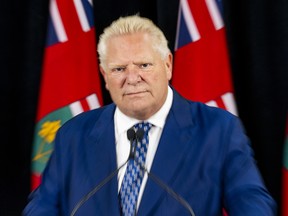World
Majority of Ontarians Concerned About Province’s Direction, Poll Shows

A recent poll conducted by Leger reveals that a significant majority of Ontarians believe their province is heading in the wrong direction. Only one-third of respondents expressed optimism about the province’s trajectory, despite Premier Doug Ford maintaining an approval rating of 45 percent. The poll, which surveyed 1,052 Ontarians from October 10 to 20, 2023, found that 55 percent of the population feels Ontario is on the wrong track.
The results indicate a growing sense of pessimism among residents. As noted by Jennifer McLeod Macey, Leger’s senior vice-president of public affairs, “There’s been a shift in moods in Ontario. Ontarians are growing more pessimistic.” While 44 percent of individuals in eastern Ontario believe the province is moving in the right direction, the sentiment is less favorable in southern Ontario, where only 29 percent share this view. In the Greater Toronto Area, the figure is 32 percent, while 30 percent of respondents from the Hamilton/Niagara regions and northern Ontario feel similarly.
In addition to geographical differences, the poll highlights a gender divide: 36 percent of men are more likely to believe Ontario is on the right track compared to just 29 percent of women. Age also plays a role, with only 22 percent of individuals aged 35 to 54 expressing confidence in the province’s direction.
Support for the Progressive Conservative Party mirrors these sentiments, as only 42 percent of its supporters believe Ontario is heading in the right direction. This is similar to the 42 percent of Ontario Liberal supporters who share the same view. In stark contrast, a substantial 70 percent of those who support the New Democratic Party (NDP) feel the province is on the wrong track.
The poll identifies housing prices and affordability as the foremost issue for Ontarians, with 17 percent of respondents citing it as their biggest concern. Among those in their home-buying years, 20 percent of individuals aged 18 to 34 and 19 percent of those aged 35 to 54 emphasize the importance of this issue. Conversely, only 12 percent of respondents aged 55 and older view housing prices as a major concern. McLeod Macey remarked, “Housing affordability continues to dominate as Ontarians’ top concern. This is especially true of younger and middle-aged adults.”
Health care also remains a significant issue, with 14 percent of Ontarians identifying it as the greatest problem facing the province. Among older adults, 21 percent cite the state of the health-care system as their primary concern. Notably, 61 percent of respondents believe that the Ford government has not performed well in health-care policy, which may contribute to the overall pessimistic mood.
Despite a multitude of concerns, other pressing issues such as the opioid crisis and climate change have not gained significant traction in public discourse. Only 2 percent of Ontarians view the opioid crisis as the biggest issue, while 3 percent cite climate change or environmental concerns.
Economic matters also weigh heavily on the minds of Ontarians. 12 percent identify the economy as the most important issue, while 11 percent highlight trade relations with the United States as a key concern. Among older respondents, 18 percent view trade with the U.S. as the largest issue, compared to just 5 percent of those aged 18 to 34.
While Ford’s government has received some approval for its handling of specific issues, support has declined in recent months. For instance, 47 percent of those polled support Ford’s relations with the federal government, and 45 percent approve of the government’s trade relations with the United States. However, disapproval is evident in areas such as transportation, where 46 percent of respondents disapprove of the government’s performance.
The most significant discontent arises in the housing sector, with 68 percent disapproving of the government’s handling of housing issues. McLeod Macey emphasized, “It’s affordability and housing that is most important to Ontarians right now — the top concern. And so if we look at the performance on those areas, there’s a lot of room for improvement.”
Despite the prevailing concerns, the poll indicates that Ford would still garner support from 44 percent of voters if an election were held tomorrow. The Ontario Liberals would secure 32 percent of the vote, while the NDP would receive 13 percent.
The poll results were weighted by age, gender, region, and education to ensure a representative sample of the Ontario population. Although no margin of error can be associated with a non-probability sample, for comparative purposes, a probability sample of 1,052 respondents would have a margin of error of plus or minus 3.0 percent, 19 times out of 20.
As Ontario navigates these pressing issues, the sentiment revealed in the poll reflects a growing need for responsive governance and effective policy solutions to address the concerns of its citizens.
-

 Science2 months ago
Science2 months agoToyoake City Proposes Daily Two-Hour Smartphone Use Limit
-

 Health3 months ago
Health3 months agoB.C. Review Reveals Urgent Need for Rare-Disease Drug Reforms
-

 Top Stories3 months ago
Top Stories3 months agoPedestrian Fatally Injured in Esquimalt Collision on August 14
-

 Technology2 months ago
Technology2 months agoDark Adventure Game “Bye Sweet Carole” Set for October Release
-

 World3 months ago
World3 months agoJimmy Lai’s Defense Challenges Charges Under National Security Law
-

 Technology3 months ago
Technology3 months agoKonami Revives Iconic Metal Gear Solid Delta Ahead of Release
-

 Lifestyle3 months ago
Lifestyle3 months agoVictoria’s Pop-Up Shop Shines Light on B.C.’s Wolf Cull
-

 Technology3 months ago
Technology3 months agoSnapmaker U1 Color 3D Printer Redefines Speed and Sustainability
-

 Technology3 months ago
Technology3 months agoApple Expands Self-Service Repair Program to Canada
-

 Technology3 months ago
Technology3 months agoAION Folding Knife: Redefining EDC Design with Premium Materials
-

 Business3 months ago
Business3 months agoGordon Murray Automotive Unveils S1 LM and Le Mans GTR at Monterey
-

 Technology3 months ago
Technology3 months agoSolve Today’s Wordle Challenge: Hints and Answer for August 19









